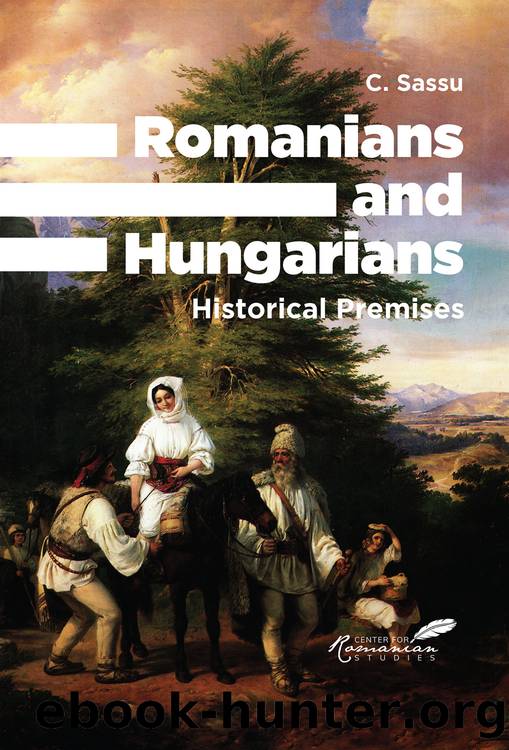Romanians and Hungarians by C. Sassu

Author:C. Sassu
Language: eng
Format: epub
Tags: History
Published: 2023-02-11T00:00:00+00:00
XIX
Character of the Transylvanian Principality
The âOpus tripartitumâ was the juridical guide and the constitutional basis of Transylvania in the period which followed. The principles of political and social injustice which it laid down corresponded so closely to the desires and mentality of the ruling classes, that foreigners nicknamed the Hungarian privileged nobility âPopulus Verböczyanusâ, and the nobles asked as recently as the middle of the eighteenth century, on the eve of the Great French Revolution, their then sovereign, a Habsburg, to restore without any modification the liberties and constitution as fixed by the tripartite code.
Stephen Verböczy, its author, as a reward, was elected Palatine of the Kingdom, acquiring thus the power to govern the country in the spirit of his laws and to lead it to disaster. And as a crowning of the destructive role they played, the privileged classes of Transylvania â the âthree nationsâ â under the leadership of their highly lauded Voivode John Zápolya, committed, at the moment of the greatest trial, also an act of treason against their country, by not taking part with their army in the unfortunate battle which took place on 29 August 1526 on the marshy places South of Mohács.
By the annihilation of the army and the death of its last king, Louis II, medieval Hungary really ceased to exist, the way being now left open to the Turks right up to the heart of Europe, namely right up to Vienna.
The events which followed the occupation of Hungary, the siege of Vienna, the fight for the crown between Ferdinand of Austria and John Zápolya until the establishment of the Turkish pashalik in Hungary, were nothing but the gradual liquidation of the old State organization of the Apostolic Kingdom following the interests and aims of the Sultan Suleiman, the unopposed arbiter of the situation. The nobles themselves, though they were the established and representative instruments of the old privileged State, had recourse to the arbitrage of the Sultan, to maintain for themselves an influential position in the new political order about to be formed in the wake of the disaster which they themselves had provoked.
John Zápolya and Ferdinand of Austria, the two competitors who had been elected kings illegally in separate diets, each by a party of the nobles, addressed themselves to the Sultan for the recognition of their title. John Zápolya more especially, who was the favorite representative of the privileged classes, considering himself to be the candidate of a party which dared to call itself ânationalâ, acted with the same total lack of scruples and respect for the interests of the community which had characterized his behavior during the fight at Mohács.
Through Jeronim Lasczky, the envoy he sent to Constantinople, he did not hesitate to offer himself and the country he desired to the Sultan, assuring him that he would be his friend and the enemy of all his adversaries and undertaking to pay a tribute of money and to guarantee by hostages his complete submission to the Sultan, his Suzerain-Lord, and the free passing through his country of Turkish troops.
Download
This site does not store any files on its server. We only index and link to content provided by other sites. Please contact the content providers to delete copyright contents if any and email us, we'll remove relevant links or contents immediately.
| Belgium | France |
| Germany | Great Britain |
| Greenland | Italy |
| Netherlands | Romania |
| Scandinavia |
The Crown by Robert Lacey(4113)
Room 212 by Kate Stewart(4112)
Endurance: Shackleton's Incredible Voyage by Alfred Lansing(3852)
The Iron Duke by The Iron Duke(3649)
The Rape of Nanking by Iris Chang(3525)
Killing England by Bill O'Reilly(3459)
Joan of Arc by Mary Gordon(3264)
Say Nothing by Patrick Radden Keefe(3068)
I'll Give You the Sun by Jandy Nelson(2845)
Hitler's Monsters by Eric Kurlander(2736)
Shadow of Night by Deborah Harkness(2724)
Margaret Thatcher: The Autobiography by Thatcher Margaret(2688)
Mary, Queen of Scots, and the Murder of Lord Darnley by Alison Weir(2680)
Darkest Hour by Anthony McCarten(2650)
Blood and Sand by Alex Von Tunzelmann(2611)
Red Famine: Stalin's War on Ukraine by Anne Applebaum(2468)
Eleanor & Park by Rainbow Rowell(2398)
The One Memory of Flora Banks by Emily Barr(2350)
Book of Life by Deborah Harkness(2269)
